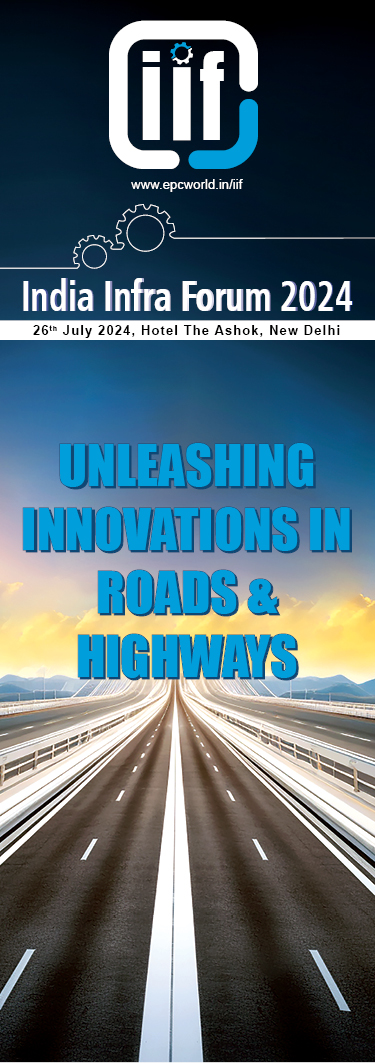How can construction insurance provide the business with a certain level of safety.BIDHAN SAHA - Practice head – Energy & Commercial Practices at JLT Independent Insurers Brokers Pvt.Ltd shares his expertise in an interaction with EPC World.
What is the scenario regarding the construction insurance in the India?
Construction business obviously has been on the rise for last decade or so, but we have seen a slight slowdown in the last couple of years. New projects are taking time to come through whether it is policies or fund issues but we have seen some slow down. The GWPs that the Indian market has shown in last couple of years, this line of business has essentially not grown. The infra side, has seen some massive turn around as projects are getting awarded on weekly basis and the sector is poised to go back to its own glory. The growth will be driven by roads and infra and the power sector and likewise we are hopeful that we will see a real movement in the construction space. Talking about construction I am restricting myself essentially to onshore construction but then there is offshore construction as well on the oil and gas side, where new projects are not taking off because the developers do not have the money owing to crash in the oil prices. We have seen some projects executed by ONGC in last year and we expect some better days ahead.
As far as the insurance part is concerned India has massive capacities on the construction space primarily on the onshore construction. As an insurance company what we have been able to provide to our clients is absolutely of international standards. But we also realize that there are areas where the services can match up to international standards only if the necessary reforms are in place. There are few areas of construction business in which India needs to create its own capacities like the offshore construction side, oil and gas side; otherwise I am very hopeful that the construction sector will develop because India has a massive need for infrastructure development and likewise there will be a requirement for construction insurance.
How would do you define comprehensive project insurance policy, what should be the parameters and how it should be made comprehensive?
Every project is unique and that is how we would definitely love to look at it. At JLT we always strive for getting our self involved from the contract stage because that is where we can really define the risk parameters. We represent our client we ensure that he is protected from all angles of insurance. A general thumb rule obviously is to understand what is the project, what kind of insurance coverage it necessitates, the size of the project, the terrain of the location of the project - more so because, if the project is located close to the coast line there are different kinds of risk parameters which have to be considered. Size will define if the project requires re-insurance support from outside.
These are the key parameters and the reason we get ourselves involved at the contractual stage, so as to understand what are the protections required, because providing a normal construction insurance is fairly simple but if look at the liability that the contractor or the owner is exposed to and we need to ensure that those parameters are protected. Starting from the contract stage helps to understand the requirements & suggesting perfect solution for it. Duration of the project is very important again and these are just a few things.
What are the solutions for such projects where sub contractors are involved?
Subcontractors today are general phenomena in project so there will be a subcontract within each and every project. The key is to ensure that the subcontractor is included in the program as an insurer. The cross liabilities arising out of the subcontractors is a critical factor because there can be liabilities which are over lapping the contractor and the subcontractor. The policy has to be placed in a way that the cross liabilities are covered between the contractor and the subcontractor. Likewise the legal liabilities of the subcontractor is an important aspect, if the list is long, then the contractor has to ensure that the subcontractor has taken a professional cover.
In cases where design is coming from the facilitator or the owner, in those cases how is contractor covered against the design defect liability?
In earlier days when contracts use to be on turnkey basis, the contractor would provide his own designs and hence the entire responsibility was with the contractor but now the complexity has increased; projects are large and there is no one single provider of design, multiple design companies are involved. Hence it is important to define their roles and responsibilities precisely so that the contractor is protected against the liability arising out of any default on the part of the subcontractor or design provider. The contractor needs to ensure that the professional indemnity cover for the design provider is in place.
In that case the design is provided by the owner and contractor is only supposed to execute the contract on the basis of the design provided by the owner, the contractor should not be held responsible for any defect in the design. But this has to be clearly laid down in the contract. In India a lot of brokers really do not get involved from the contract stage and that is something which at times gets overlooked. At JLT we essentially get involved from the contract stage and conduct contract reviews for our client. If it is an owner driven program, there has to be a construction policy obviously, but one needs to ensure that the contractor is taking a PI policy
What would be the basic guidelines for a company looking for Construction Insurance for a large sized project?
The key is to understand the responsibilities & risks involved. Not too many insurance professionals will tell you this but that is the key. One has to clearly know what you are responsible for and what you are not responsible for. The other key factors involved are size of the project, lenders requirements, location of the project, types of coverage it requires; the liability part is equally important. Make sure damage claims are fairly simple and the covers are tried and tested; one also needs to look at what are the liabilities that can trigger out of it and there should be decent enough protection for that. In India, the policy does not allow for more than 10% of the policy sum assured as a third party liability cover. If as a contractor one feels that the claim amount could be much higher than that you should always look for a separate CGL program, separate liability program outside the construction policy.
Brief us about the professional liability coverage for the large construction projects?
Professional indemnity is very important. Today we are seeing that each and every contractor is going for professional indemnity policy but unfortunately, what we have seen in India that unless there is a contractual obligation for the contractor to take a professional indemnity they are not taking it.
That means that if as an owner if I am awarding a contract to an EPC contractor and I am not making it a contractual obligation for the contractor to take a professional indemnity policy and if there is a professional indemnity triggering tomorrow the contractor is going to raise his hands and say it was not my contractual requirement and hence the entire loss is on the owner.
Hence the owner needs to ensure that the contractor goes for a professional indemnity program. For the contractor it is important to ensure that the subcontractor takes a professional indemnity policy; the international markets may be prone to liabilities but the Indian market too is catching up. The amount of professional indemnity policies that have been issued in last couple of years has not been massive, but given the development we are witnessing I am positive the numbers will go up. At JLT we provide long term project BI policies for contractors and it is easily available.
When you do the risk evaluation for a project, does it really helps in a better risk management?
Absolutely, so when you are talking about operational risks India has been fairly up to the mark in terms of the awareness towards risk management, at least the larger companies are. But the moment we talk about Construction Company, the most underrated term is the risk management. There is a clear lack of risk management. Very large multinational companies are doing it but many midsized or smaller contractors have not embraced it as yet. There is a definite need for risk management and we provide those services of risk management. We monitor those projects, how they are panning out, how they are storing stuff when they are doing the erection because a lot of times we have seen claims coming out of these things.






